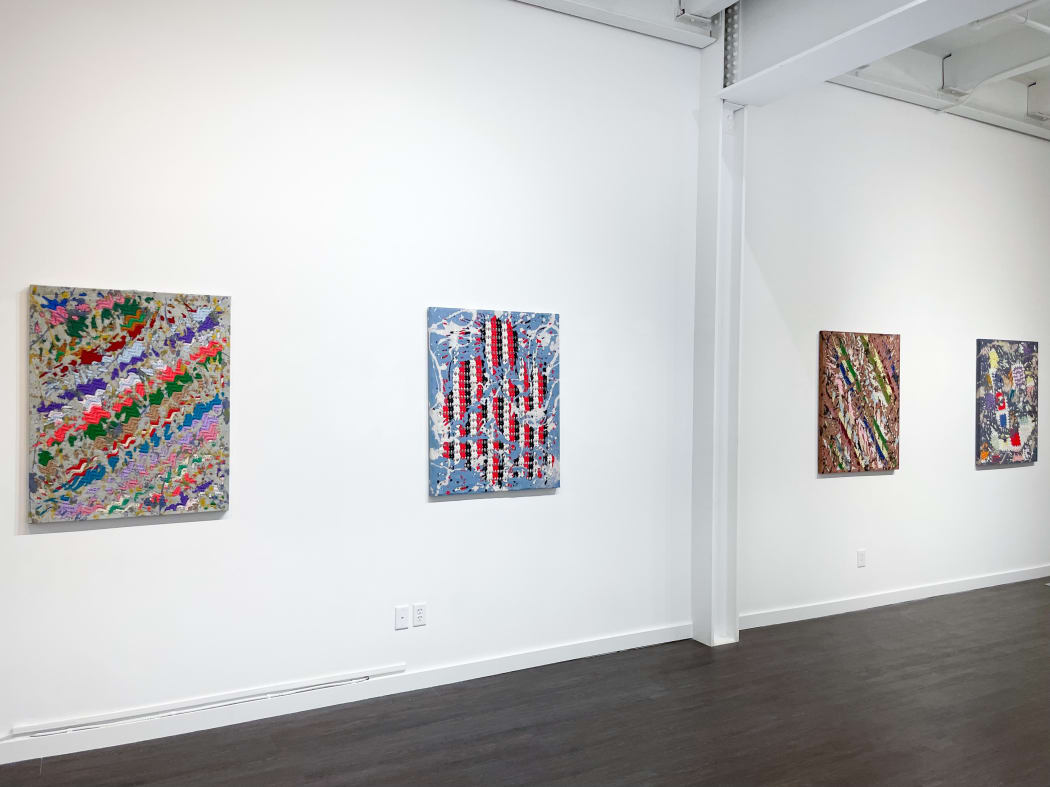
Abigail Ogilvy Gallery is proud to present Rooted in Transit, a two-person exhibition featuring new artworks by Lavaughan Jenkins and introducing Nick Fagan. As a true painter, Lavaughan Jenkins will present his highly textured Love Portals series alongside multimedia artist Nick Fagan’s textile works, including a site-specific installation. For both artists, the works on view are form of self-expression in a deeply personal way. In Jenkins’ new series, the paintings are a record of certain moments in his past, a reminder of love lost – yet they allow the possibility to reconnect with the person or memory on the other side of the portal. For Fagan, the materiality of moving blankets holds a personal importance to the artist, allowing the found material to have a second life. His material research reveals a deeper history of an otherwise common object, the stains and marks are physical traces of activity that charge the material with a record that transcends an individual person or a specific moment. Both Fagan and Jenkins are heavily inform in their artistic practice through their own lived histories. The artists have spent several years creating from one city to the next through residencies and personal moves. This sense of geographic temporality ultimately results in artworks that convey this complex relationship with movement both physically and through memory.
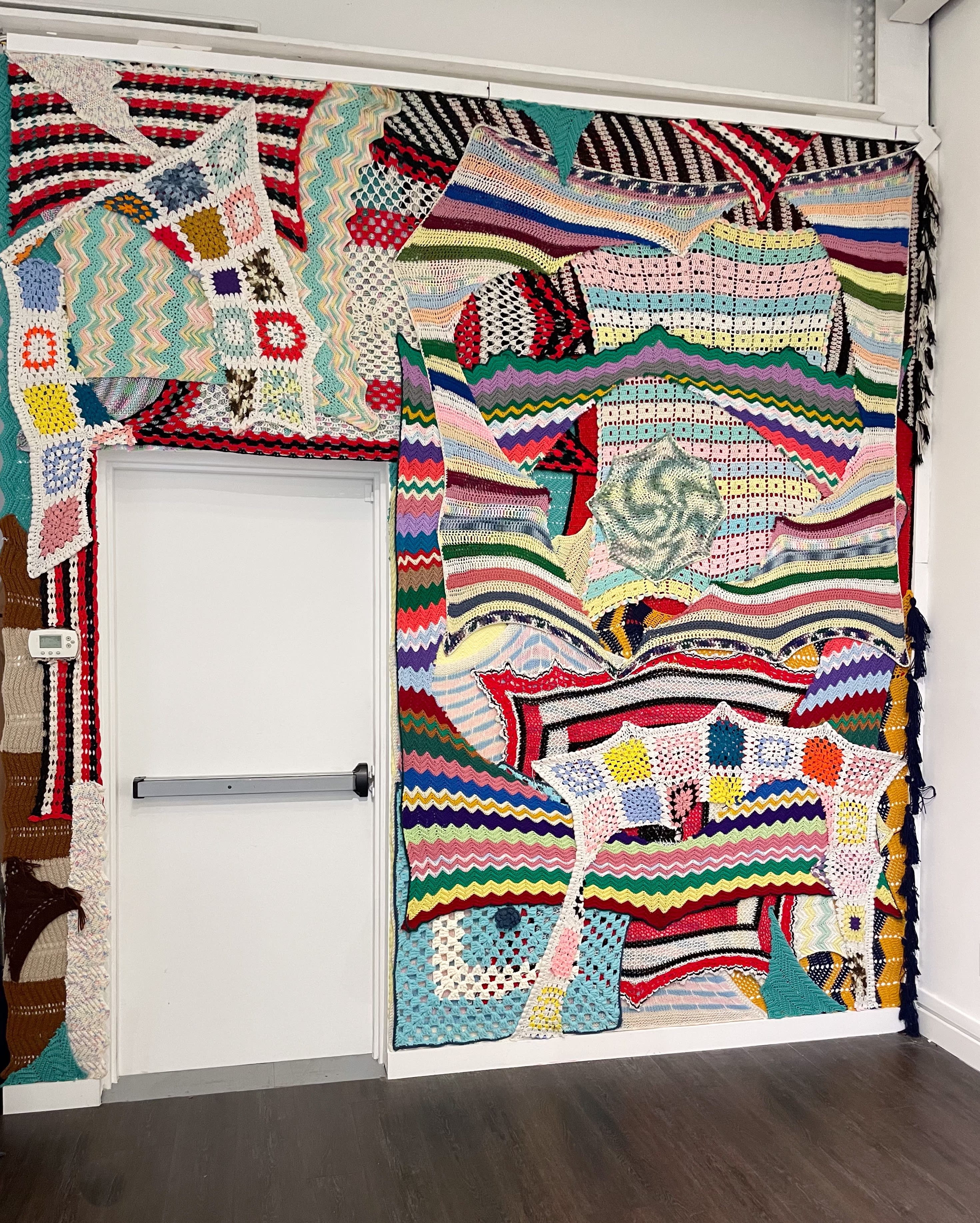
Nick Fagan, Site Specific Installation, Materials: Found / Thrifted Blankets
Nick Fagan finds answers to questions through his process. With a drawing practice as a foundation, and an interest in additive and subtractive sculptural processes, the work begins with close research of a found material. Combining playful experimentation with a system of rules and formulas to guide the process, the material research reveals a deeper history of an otherwise common object. By searching for beauty in practical and utilitarian objects, Fagan’s practice acts as a conduit for the material’s history to be seen through a spiritual lens. By referencing religious sacrament and ritual, he sees the material’s ability to transform from banal into divine, and hold a more grand narrative than that of the individual who may have used or interacted with it under practical conditions.
For Fagan, the work comes together without prior planning, instead it is reactionary to the materials, process, and the act of creating. He works quickly, therefore there is little time to plan and think. Much like breaking a brick on the ground only to find the meaning in the act of cleaning, the results of the artwork are solely found in the process. The site-specific wall installation on view emphasizes the importance he places on the thrifted objects. The work is vibrant, joyful, colorful – exposing his intentionality around the idea that the items are both precious, yet not so precious that they cannot be touched. Language exists in his work along a spectrum of abstraction from somewhat readable text to a tangle of unrecognizable forms that resemble the aesthetics of letters or numbers but are completely illegible. This abstraction stems from the artist’s experience with dyslexia and seeing language as a confusion of symbols. The transformation of text-like forms into completely abstracted shapes embed them with other cultural signifiers that relate to cartoons and animation, Gilded Age architecture and ornament, and the image of the phallus.
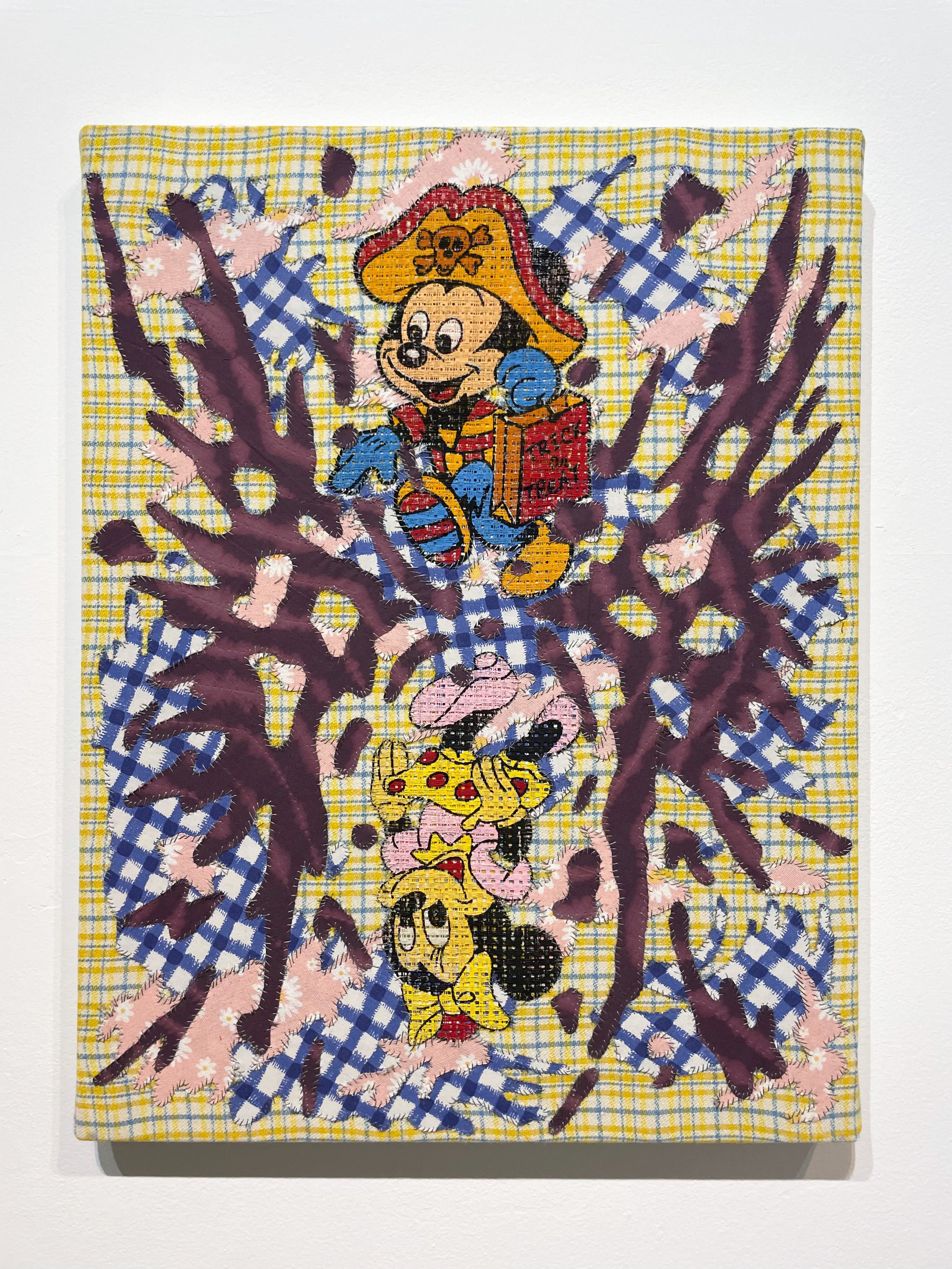
By creating playful, cartoonish curves, flaccid forms, and soft colors in a larger-than-life scale, Fagan references manhood according to the duality between the strength and humility. By accessing his personal history and meditating on experiences with spirituality and religion, language and disability, and the duality of masculinity, Fagan can explore tensions between the personal and the public. The use of banal materials in the work connects his specific personal identity to the common history of the larger public.
Lavaughan Jenkins’ works on view are bold, colorful, and emotionally significant paintings that allow the artist to process memories of past connections. Jenkins moved several times over the past two years, and while creating the Love Portals series he was processing the loss of a relationship. By creating the artworks, Jenkins can face his feelings and acknowledge recent experiences of pain and isolation, but his artistry also reminds him of the many beautiful moments that occurred over the years that he wanted to capture and remember. The resulting paintings are a bold expression of the artist’s voice and story.
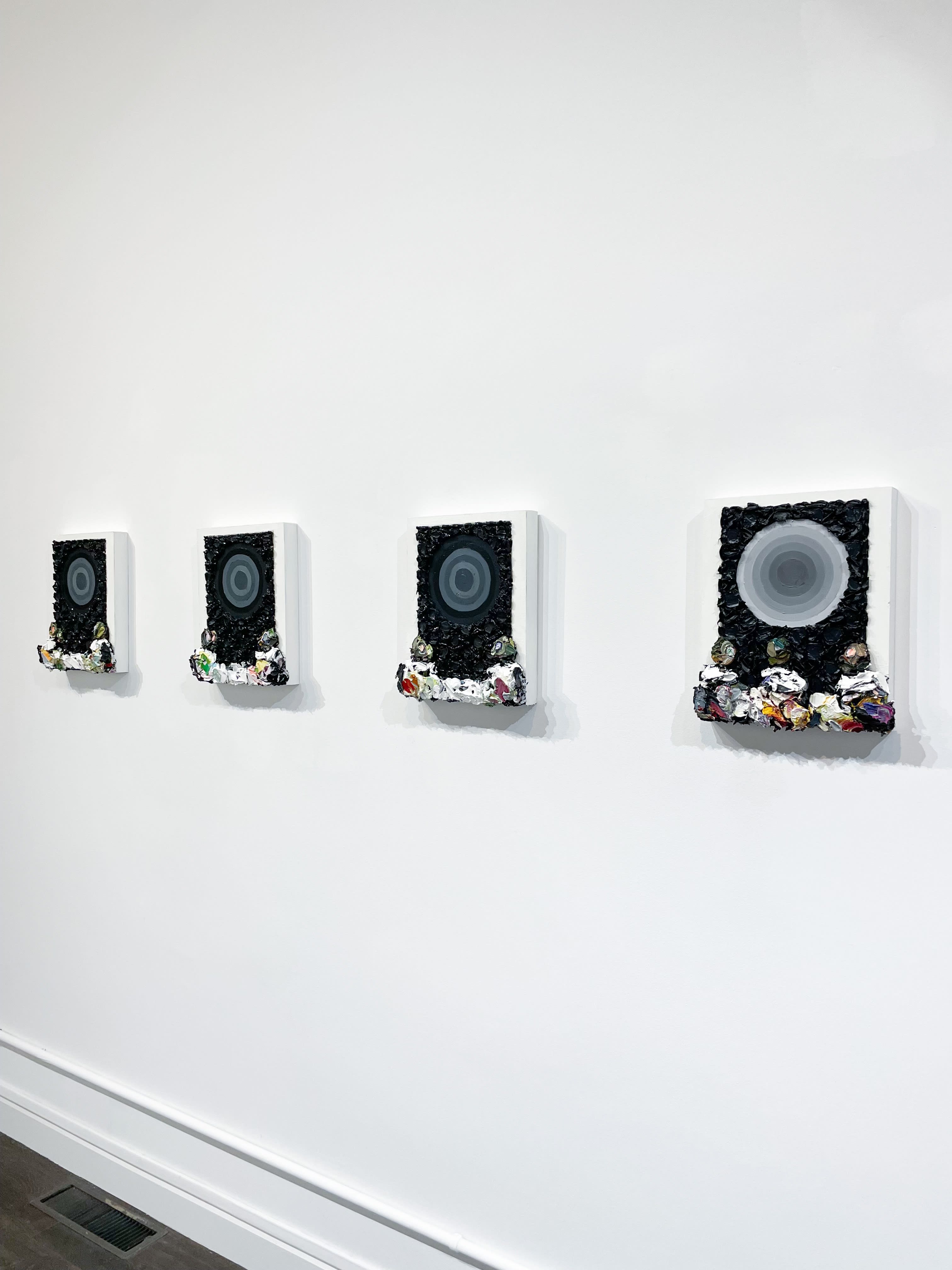
As a long-time artist working in Boston, Jenkins’ new work shows the growth he experienced as an artist – while also nodding to his past styles and concepts. The three figures along the edge of the paintings have been present in his work for over five years. Taken from the character of the doctors in Nicole Krauss’ book Man Walks into a Room, the figures are extracting memories from Jenkins’ as they do in the narrative, pulling the artist’s thoughts and feelings and placing them onto the paintings. The memories pass through the portals, connecting the artist with the past and allowing him to revisit a specific moment with the hopes of reconnection. He is thinking about all relationships: family, friends, and loved ones.
When thinking about the past, he turns to James Baldwin: "In any case, the world changes then, and it changes forever. Because you love one human being, you see everyone else very differently than you saw them before - perhaps I only mean to say that you begin to see - and you are both stronger and more vulnerable, both free and bound. Free, paradoxically, because, now, you have a home - your lover's arms. And bound: to that mystery, precisely, a bondage which liberates you into something of the glory and suffering of the world."
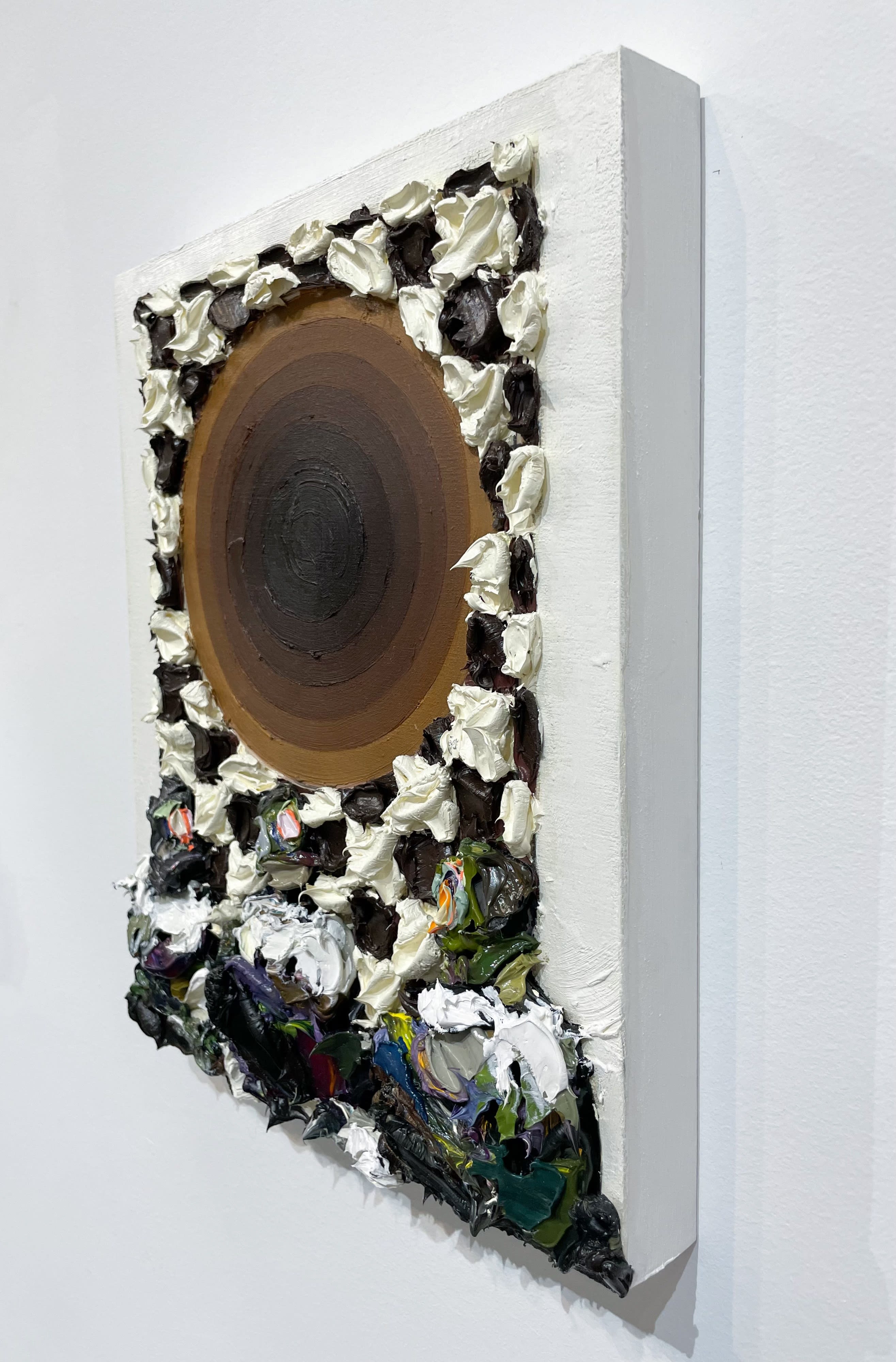
In thinking about the future, Jenkins looks to Nikita Gill:
“May you always know pain as temporary and laughter better.
May the universe bless you with the perseverance to try harder.
May you build a kinder history than the ruins you were given.
May the greatest gift you receive be more than just a life,
but a life where the world is safer,
a life so full of love and joy that it is worth living.”
Inspired by the above words, the many portals on view allow the viewer to transport to another time and place, looking hopefully to the future and what lies ahead.


Add a comment